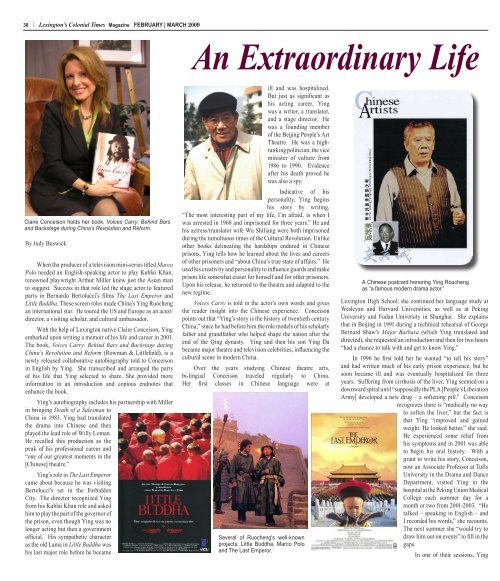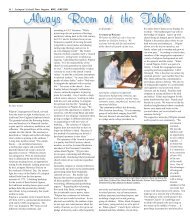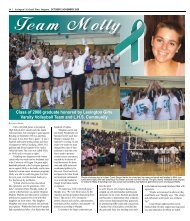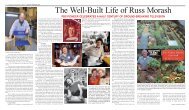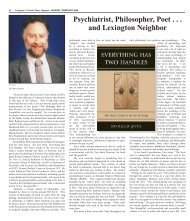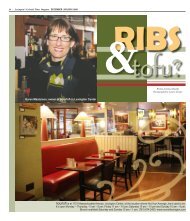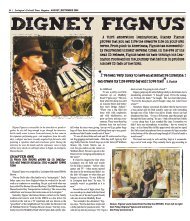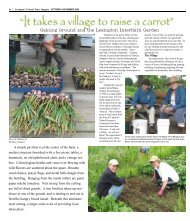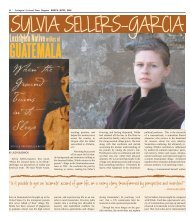Local Author Clare Concesion on the Life of Ying Reusch
Local Author Clare Concesion on the Life of Ying Reusch
Local Author Clare Concesion on the Life of Ying Reusch
Create successful ePaper yourself
Turn your PDF publications into a flip-book with our unique Google optimized e-Paper software.
38 | Lexingt<strong>on</strong>’s Col<strong>on</strong>ial Times Magazine FEBRUARY | MARCH 2009<br />
Claire C<strong>on</strong>ceis<strong>on</strong> holds her book, Voices Carry: Behind Bars<br />
and Backstage during China’s Revoluti<strong>on</strong> and Reform.<br />
By Judy Buswick<br />
When <strong>the</strong> producer <strong>of</strong> a televisi<strong>on</strong> mini-series titled Marco<br />
Polo needed an English-speaking actor to play Kublai Khan,<br />
renowned playwright Arthur Miller knew just <strong>the</strong> Asian man<br />
to suggest. Success in that role led <strong>the</strong> stage actor to featured<br />
parts in Bernardo Bertolucci’s films The Last Emperor and<br />
Little Buddha. These screen roles made China’s <strong>Ying</strong> Ruocheng<br />
an internati<strong>on</strong>al star. He toured <strong>the</strong> US and Europe as an actor/<br />
director, a visiting scholar, and cultural ambassador.<br />
With <strong>the</strong> help <strong>of</strong> Lexingt<strong>on</strong> native Claire C<strong>on</strong>ceis<strong>on</strong>, <strong>Ying</strong><br />
embarked up<strong>on</strong> writing a memoir <strong>of</strong> his life and career in 2001.<br />
The book, Voices Carry: Behind Bars and Backstage during<br />
China’s Revoluti<strong>on</strong> and Reform (Rowman & Littlefield), is a<br />
newly released collaborative autobiography told to C<strong>on</strong>ceis<strong>on</strong><br />
in English by <strong>Ying</strong>. She transcribed and arranged <strong>the</strong> parts<br />
<strong>of</strong> his life that <strong>Ying</strong> selected to share. She provided more<br />
informati<strong>on</strong> in an introducti<strong>on</strong> and copious endnotes that<br />
enhance <strong>the</strong> book.<br />
<strong>Ying</strong>’s autobiography includes his partnership with Miller<br />
in bringing Death <strong>of</strong> a Salesman to<br />
China in 1983. <strong>Ying</strong> had translated<br />
<strong>the</strong> drama into Chinese and <strong>the</strong>n<br />
played <strong>the</strong> lead role <strong>of</strong> Willy Loman.<br />
He recalled this producti<strong>on</strong> as <strong>the</strong><br />
peak <strong>of</strong> his pr<strong>of</strong>essi<strong>on</strong>al career and<br />
“<strong>on</strong>e <strong>of</strong> our greatest moments in <strong>the</strong><br />
[Chinese] <strong>the</strong>atre.”<br />
<strong>Ying</strong>’s role in The Last Emperor<br />
came about because he was visiting<br />
Bertolucci’s set in <strong>the</strong> Forbidden<br />
City. The director recognized <strong>Ying</strong><br />
from his Kublai Khan role and asked<br />
him to play <strong>the</strong> part <strong>of</strong> <strong>the</strong> governor <strong>of</strong><br />
<strong>the</strong> pris<strong>on</strong>, even though <strong>Ying</strong> was no<br />
l<strong>on</strong>ger acting but <strong>the</strong>n a government<br />
<strong>of</strong>ficial. His sympa<strong>the</strong>tic character<br />
as <strong>the</strong> old Lama in Little Buddha was<br />
his last major role before he became<br />
An Extraordinary <strong>Life</strong><br />
ill and was hospitalized.<br />
But just as significant as<br />
his acting career, <strong>Ying</strong><br />
was a writer, a translator,<br />
and a stage director. He<br />
was a founding member<br />
<strong>of</strong> <strong>the</strong> Beijing People’s Art<br />
Theatre. He was a highranking<br />
politician, <strong>the</strong> vice<br />
minister <strong>of</strong> culture from<br />
1986 to 1990. Evidence<br />
after his death proved he<br />
was also a spy.<br />
Indicative <strong>of</strong> his<br />
pers<strong>on</strong>ality, <strong>Ying</strong> begins<br />
his story by writing,<br />
“The most interesting part <strong>of</strong> my life, I’m afraid, is when I<br />
was arrested in 1968 and impris<strong>on</strong>ed for three years.” He and<br />
his actress/translator wife Wu Shiliang were both impris<strong>on</strong>ed<br />
during <strong>the</strong> tumultuous times <strong>of</strong> <strong>the</strong> Cultural Revoluti<strong>on</strong>. Unlike<br />
o<strong>the</strong>r books delineating <strong>the</strong> hardships endured in Chinese<br />
pris<strong>on</strong>s, <strong>Ying</strong> tells how he learned about <strong>the</strong> lives and careers<br />
<strong>of</strong> o<strong>the</strong>r pris<strong>on</strong>ers and “about China’s true state <strong>of</strong> affairs.” He<br />
used his creativity and pers<strong>on</strong>ality to influence guards and make<br />
pris<strong>on</strong> life somewhat easier for himself and for o<strong>the</strong>r pris<strong>on</strong>ers.<br />
Up<strong>on</strong> his release, he returned to <strong>the</strong> <strong>the</strong>atre and adapted to <strong>the</strong><br />
new regime.<br />
Voices Carry is told in <strong>the</strong> actor’s own words and gives<br />
<strong>the</strong> reader insight into <strong>the</strong> Chinese experience. C<strong>on</strong>ceis<strong>on</strong><br />
points out that “<strong>Ying</strong>’s story is <strong>the</strong> history <strong>of</strong> twentieth century<br />
China,” since he had before him <strong>the</strong> role models <strong>of</strong> his scholarly<br />
fa<strong>the</strong>r and grandfa<strong>the</strong>r who helped shape <strong>the</strong> nati<strong>on</strong> after <strong>the</strong><br />
end <strong>of</strong> <strong>the</strong> Qing dynasty. <strong>Ying</strong> and <strong>the</strong>n his s<strong>on</strong> <strong>Ying</strong> Da<br />
became major <strong>the</strong>atre and televisi<strong>on</strong> celebrities, influencing <strong>the</strong><br />
cultural scene in modern China.<br />
Over <strong>the</strong> years studying Chinese <strong>the</strong>atre arts,<br />
bi-lingual C<strong>on</strong>ceis<strong>on</strong> traveled regularly to China.<br />
Her first classes in Chinese language were at<br />
Several <strong>of</strong> Ruocheng's well-known<br />
projects: Little Buddha, Marco Polo<br />
and The Last Emperor.<br />
A Chinese postcard h<strong>on</strong>oring <strong>Ying</strong> Roucheng<br />
as “a famous modern drama actor.”<br />
Lexingt<strong>on</strong> High School; she c<strong>on</strong>tinued her language study at<br />
Wesleyan and Harvard Universities, as well as at Peking<br />
University and Fudan University in Shanghai. She explains<br />
that in Beijing in 1991 during a technical rehearsal <strong>of</strong> George<br />
Bernard Shaw’s Major Barbara (which <strong>Ying</strong> translated and<br />
directed), she requested an introducti<strong>on</strong> and <strong>the</strong>n for two hours<br />
“had a chance to talk with and get to know <strong>Ying</strong>.”<br />
In 1996 he first told her he wanted “to tell his story”<br />
and had written much <strong>of</strong> his early pris<strong>on</strong> experience, but he<br />
so<strong>on</strong> became ill and was eventually hospitalized for three<br />
years. Suffering from cirrhosis <strong>of</strong> <strong>the</strong> liver, <strong>Ying</strong> seemed <strong>on</strong> a<br />
downward spiral until “supposedly <strong>the</strong> PLA [People’s Liberati<strong>on</strong><br />
Army] developed a new drug – a s<strong>of</strong>tening pill.” C<strong>on</strong>ceis<strong>on</strong><br />
recognizes <strong>the</strong>re is “medically no way<br />
to s<strong>of</strong>ten <strong>the</strong> liver,” but <strong>the</strong> fact is<br />
that <strong>Ying</strong> “improved and gained<br />
weight. He looked better,” she said.<br />
He experienced some relief from<br />
his symptoms and in 2001 was able<br />
to begin his oral history. With a<br />
grant to write his story, C<strong>on</strong>ceis<strong>on</strong>,<br />
now an Associate Pr<strong>of</strong>essor at Tufts<br />
University in <strong>the</strong> Drama and Dance<br />
Department, visited <strong>Ying</strong> in <strong>the</strong><br />
hospital at <strong>the</strong> Peking Uni<strong>on</strong> Medical<br />
College each summer day for a<br />
m<strong>on</strong>th or two from 2001-2003. “He<br />
talked – speaking in English – and<br />
I recorded his words,” she recounts.<br />
The next summer she “would try to<br />
draw him out <strong>on</strong> events” to fill in <strong>the</strong><br />
gaps.<br />
In <strong>on</strong>e <strong>of</strong> <strong>the</strong>ir sessi<strong>on</strong>s, <strong>Ying</strong>
Arthur Miller with <strong>Ying</strong> Rouchen in Beijing in<br />
1983.<br />
menti<strong>on</strong>ed that in 1948 his fa<strong>the</strong>r <strong>Ying</strong> Qianli, who had<br />
escaped to Taiwan (or been taken unwillingly), had left behind<br />
his wife and seven surviving children, never to see <strong>the</strong>m again.<br />
As <strong>Ying</strong> Qianli “rose to a prominent positi<strong>on</strong> in Taiwan’s<br />
Ministry <strong>of</strong> Educati<strong>on</strong> and at Nati<strong>on</strong>al Taiwan University, he<br />
lived al<strong>on</strong>e in university housing and became a patr<strong>on</strong> to a child<br />
<strong>of</strong> neighbors,” says C<strong>on</strong>ceis<strong>on</strong>. She assumes he must have<br />
been l<strong>on</strong>ely without his family and took comfort in helping<br />
Stella Shen. <strong>Ying</strong>’s fa<strong>the</strong>r paid for her educati<strong>on</strong> in <strong>the</strong> United<br />
States. During <strong>on</strong>e summer interview in 2002, <strong>Ying</strong> Roucheng<br />
Salesman Cast, 1983.<br />
Courtesy <strong>of</strong> Claire<br />
C<strong>on</strong>ceis<strong>on</strong>.<br />
FEBRUARY | MARCH 2009 Lexingt<strong>on</strong>’s Col<strong>on</strong>ial Times Magazine | 39<br />
Voices Carry: Behind Bars and Backstage during China’s Revoluti<strong>on</strong><br />
reported that Stella was still living in <strong>the</strong> States.<br />
C<strong>on</strong>ceis<strong>on</strong> asked, “Which state?” Massachusetts.<br />
She asked, “Where in Massachusetts?” Lexingt<strong>on</strong>.<br />
She asked, “What street?” She knew <strong>the</strong> locati<strong>on</strong> and was<br />
amazed at <strong>the</strong> serendipitous coincidence <strong>of</strong> this being <strong>the</strong> town<br />
where she’d grown up.<br />
On returning <strong>the</strong> Lexingt<strong>on</strong>, C<strong>on</strong>ceis<strong>on</strong> ph<strong>on</strong>ed Stella<br />
Shen and was greeted warmly. Ms. Shen recounted how years<br />
ago she had known that <strong>Ying</strong> Roucheng was traveling in <strong>the</strong><br />
West. She managed to track him down by ph<strong>on</strong>e and introduced<br />
herself to him. She began to cry and he had no idea what <strong>the</strong><br />
Chinese woman <strong>on</strong> <strong>the</strong> ph<strong>on</strong>e meant by, “I’m your sister.” At<br />
that point he didn’t know that his fa<strong>the</strong>r had mentored her and<br />
that she called his fa<strong>the</strong>r “Uncle.” Eventually <strong>Ying</strong> visited his<br />
“adopted sister” and “she showed him pictures <strong>of</strong> his fa<strong>the</strong>r and<br />
told about his and her lives. They were friends for life, after<br />
that,” says C<strong>on</strong>ceis<strong>on</strong>.<br />
Shen was accommodating to C<strong>on</strong>ceis<strong>on</strong>, as well, and<br />
shared letters and photographs with her, as she worked <strong>on</strong> <strong>the</strong><br />
book. <strong>Ying</strong> visited Shen in Lexingt<strong>on</strong> several times in <strong>the</strong> years<br />
after <strong>the</strong>ir teleph<strong>on</strong>e meeting, up until his illness. C<strong>on</strong>ceis<strong>on</strong><br />
saw him for <strong>the</strong> last time in August, 2003, four m<strong>on</strong>ths before<br />
his death.<br />
As a side note, C<strong>on</strong>ceis<strong>on</strong> reports that Stella Shen raised<br />
her children in Lexingt<strong>on</strong>. She worked as a librarian at <strong>the</strong><br />
Robbins Library in Arlingt<strong>on</strong> and built up <strong>the</strong>ir collecti<strong>on</strong> <strong>of</strong><br />
Chinese material.<br />
In Voices Carry, <strong>Ying</strong> recounts something <strong>of</strong> his childhood,<br />
growing up in a family <strong>of</strong> academics with certain privileges. His<br />
family lived in Peking for seven years in <strong>the</strong> aband<strong>on</strong>ed palace<br />
C<strong>on</strong>tinued <strong>on</strong> page 43<br />
Willy, Biff and Happy — <strong>Ying</strong> and cast members for Death <strong>of</strong> A<br />
Salesman, 1983. Courtesy <strong>of</strong> Claire C<strong>on</strong>ceis<strong>on</strong>.<br />
Stella Shen’s house — <strong>Ying</strong> visited Lexingt<strong>on</strong><br />
several times. Here he is <strong>on</strong> a bicycle at 71 Hancock<br />
Street. Courtesy <strong>of</strong> Claire C<strong>on</strong>ceis<strong>on</strong>.<br />
<strong>Ying</strong><br />
Ruocheng<br />
and Claire<br />
in 2001 at<br />
<strong>Ying</strong>’s home<br />
in China.
An Extraordinary <strong>Life</strong>, C<strong>on</strong>tinued from page 39<br />
<strong>of</strong> Prince Qing, which was “just beside Furen<br />
University, <strong>the</strong> university my grandfa<strong>the</strong>r<br />
had helped to create, where my fa<strong>the</strong>r was a<br />
pr<strong>of</strong>essor,” said <strong>Ying</strong>. He had Western friends<br />
from his years in Catholic missi<strong>on</strong>ary schools,<br />
where he had learned English. Many o<strong>the</strong>r<br />
foreign friends developed from his career<br />
in <strong>the</strong> <strong>the</strong>atre. The Communist government<br />
asked him to report what happened during his<br />
dinners with friends and travels abroad.<br />
C<strong>on</strong>ceis<strong>on</strong> writes that “<strong>Ying</strong> did not<br />
want to publish anything in print that might<br />
cause problems for any<strong>on</strong>e,” so details <strong>of</strong><br />
this informati<strong>on</strong> sharing was not included in<br />
<strong>Ying</strong>’s account <strong>of</strong> his life. C<strong>on</strong>ceis<strong>on</strong> writes<br />
that <strong>Ying</strong> loved China and saw it as his duty<br />
“to foster understanding between China and<br />
<strong>the</strong> West – through <strong>the</strong>atre, translati<strong>on</strong>, and<br />
politics – by staying in China and not leaving<br />
when things got tough.”<br />
O<strong>the</strong>r aspects <strong>of</strong> his pers<strong>on</strong>al life, besides<br />
being an informant, were skimmed over, as<br />
well. He does not tell much about his wife<br />
Wu Shiliang or <strong>the</strong>ir two children, though<br />
his young s<strong>on</strong> <strong>Ying</strong> Da roamed <strong>the</strong> streets<br />
unsupervised by his grandmo<strong>the</strong>r, when<br />
his parents were both in pris<strong>on</strong>. At <strong>the</strong> time<br />
<strong>of</strong> Wu’s death in 1987, she was translating<br />
Bette Boa Lord’s novel Spring Mo<strong>on</strong>, and<br />
<strong>Ying</strong> completed <strong>the</strong> work for her. He seems<br />
genuinely devoted to her, but also had o<strong>the</strong>r<br />
women in his life. As with any<strong>on</strong>e who writes<br />
a life narrative, <strong>the</strong> questi<strong>on</strong> arises as to what<br />
to include and what to leave out. “He didn’t<br />
want to kiss and tell,” reports C<strong>on</strong>ceis<strong>on</strong>.<br />
When his life ended after several years<br />
<strong>of</strong> hospitalizati<strong>on</strong>, <strong>Ying</strong> was in <strong>the</strong> process<br />
<strong>of</strong> translating Shakespeare’s Coriolanus into<br />
Chinese. C<strong>on</strong>ceis<strong>on</strong> p<strong>on</strong>dered, “Who does<br />
that?” He was a remarkable man and this<br />
collaborative autobiography (Voices Carry:<br />
Behind Bars and Backstage during China’s<br />
Revoluti<strong>on</strong> and Reform) extends his legacy to<br />
Western readers. It is so<strong>on</strong> to be translated<br />
into Chinese and published in China with <strong>the</strong><br />
help <strong>of</strong> <strong>Ying</strong> Da, to capture <strong>the</strong> t<strong>on</strong>e <strong>of</strong> his<br />
fa<strong>the</strong>r’s Chinese voice.<br />
“If <strong>Ying</strong> Roucheng had <strong>on</strong>e unique<br />
quality besides his keen memory, it was<br />
his cheery view <strong>of</strong> life. He chided despair<br />
and embraced hope,” c<strong>on</strong>cludes C<strong>on</strong>ceis<strong>on</strong><br />
in her introducti<strong>on</strong> to <strong>the</strong> collaborative<br />
autobiography.<br />
Additi<strong>on</strong>al info: Learn more about<br />
Voices Carry at<br />
voicescarrybook.wordpress.com


